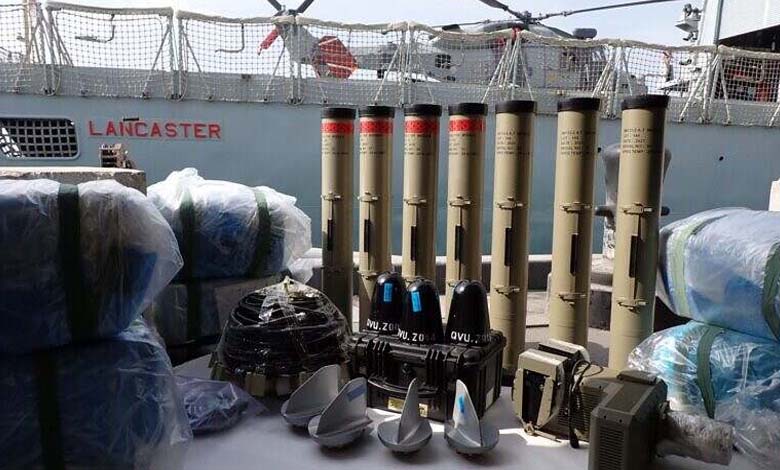Seizure of Sabotage Equipment and Explosives… Houthi Smuggling Networks Crumble

After the lull in U.S. airstrikes that had previously weakened the Houthis, Iran has resumed its efforts to smuggle military equipment to the militias, in an attempt to compensate for the depletion of their weapons stockpiles.
-
Houthis Hide Their Dead… Funerals Banned and Condolences Forbidden
-
The Demons’ Deal: Houthis Release Al-Qaeda Terrorists to Reinforce Their Frontlines
Two recently intercepted arms shipments by Yemeni authorities and the National Resistance have revealed that Iran remains a key supplier of weapons and military equipment to the Houthis, in blatant defiance of U.N. resolutions banning arms supplies to these militias.
Despite Iran’s attempts to mask its involvement through complex smuggling routes, repeated seizures show Tehran’s continued military support to its proxies, aiming, according to observers, to “replace what the militias recently lost due to U.S. strikes.”
-
A Muslim Brotherhood military commander threatens to hand over military positions to the Houthis
-
American Airstrikes on Houthis Expose the Double Standard of Yemen’s Muslim Brotherhood
Successive Strikes
On Saturday, the National Resistance announced the seizure of “3 million detonators, 3,600 kilometers of wire, and 64 satellite communication devices” in two separate operations in the Red Sea.
These detonators are used in the making of various explosive devices, booby-trapped boats, suicide drones, minefields activated by batteries or remote systems, and for demolishing homes, bridges, roads, and vital infrastructure.
The wires—used as blasting fuses—are essential for linking explosive devices and engineering networks used in landmines, ambushes, and house demolitions. According to the National Resistance, the amount seized is sufficient to rig an area of 46 square kilometers—twice the size of Hodeidah city.
-
The Muslim Brotherhood and the Houthis… Playing Openly After “Under-the-Table” Alliances
-
Houthis Call on the Muslim Brotherhood Regarding Syria
Since the beginning of the year, Houthi militias have been hit with eight significant blows by the National Resistance, Yemeni customs, and joint forces.On May 4, joint forces (Giants Brigades, Nation Shield, and Security Belt) intercepted a shipment of munitions and shoulder-fired missiles on the coast of Ras Al-Arah in Lahij (south), near Bab Al-Mandab, before it could reach the Houthis. On April 28, another smuggled shipment of munitions heading to the Houthis was seized in the same area.
-
Houthis Launch Ideological and Military Recruitment Campaign for Students Amid Public Outrage
-
Houthis Threaten Israel amid Stalled Second Round of Truce Negotiations
On March 24, Yemeni customs intercepted 800 drone propellers made by the Chinese company GEFMAN at the Sarfeet border crossing in Al-Mahra (east).On March 14, customs officials seized five drone controllers used to encode and control signals from remote devices. Four days earlier, six wireless military communication devices had also been intercepted at the same crossing.In February, the Houthis suffered one of their biggest blows when the National Resistance intercepted a shipment of advanced weapons, including cruise missile bodies and jet engines used in suicide drones, coming from Iran through the port of Al-Salif in Al-Hodeidah.
-
Houthis Torture a Young Man to Death for Refusing to Join Their Training… Details
-
4 Days Until the Houthis Are Designated as a Terrorist Organization… What Is the Militia’s Future?
January, two operations in the free zone uncovered: the first, 180 servo motors used in drone wings and robots, along with 1,760 electronic boards and sensors; the second, 62 radio-frequency (walkie-talkie) devices hidden inside a shipment of household items bound for the Houthis in northern Yemen.
Exposing Smuggling Networks
These arms seizures are crucial in undermining militia capabilities and are part of broader efforts to combat illegal weapons trafficking.
Experts argue that these interceptions expose secret smuggling networks linked to the Houthis and Iran, providing better insight into the methods used and paving the way for further action against those involved, including Houthi leaders and members of Iran’s Revolutionary Guard Corps.
-
The Houthis Attempt to Seize Residents’ Lands in Taiz and Turn Them into Mobilization Camps
-
Signs of Major Disputes between the Muslim Brotherhood and the Houthis… Details
According to Yemeni Minister of Information Moammar Al-Eryani, these seizures confirm Iran’s continued smuggling of weapons and military equipment to the militias, in open violation of international resolutions, especially U.N. Security Council Resolution 2216.
He emphasized that these shipments reflect Iran’s persistence in supplying the Houthis with advanced weaponry, at a time when it should be contributing to de-escalation efforts. In reality, Tehran is using its ongoing negotiations with the United States as a cover to buy time and rebuild its proxy networks after recent setbacks.
Al-Eryani urged the international community to adopt a firm stance, intensify pressure on the Iranian regime to halt arms smuggling to militias, tighten naval controls on smuggling routes, and work toward designating the Houthis as a “global terrorist organization,” as already done by the U.S. and other countries, since this group poses a threat not only to Yemen but to global peace and security.












